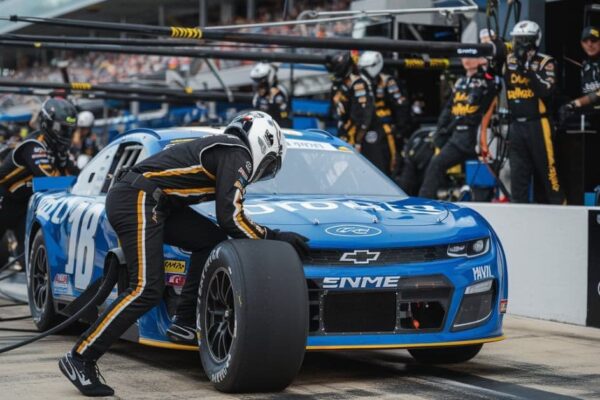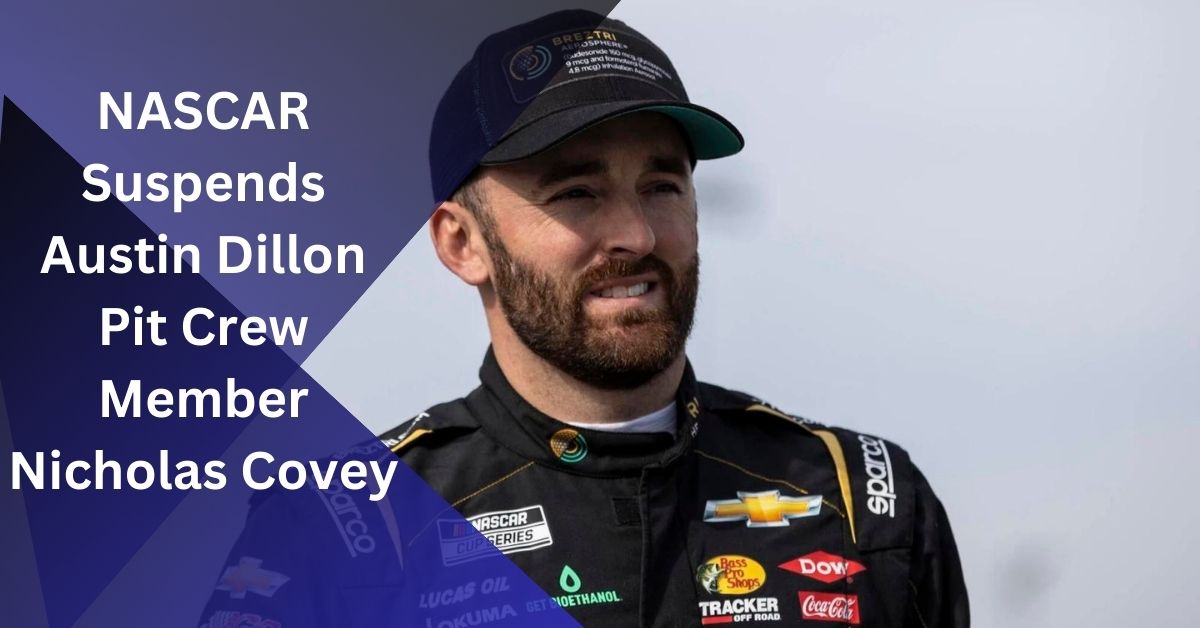In the world of NASCAR, team members and their contributions are as critical to success as the drivers themselves. Recently, headlines focused on a suspension involving Austin Dillon’s pit crew member, Nicholas Covey, due to a violation of NASCAR’s substance abuse policy.
This article will explore the details surrounding the incident, the context of NASCAR’s strict policies, and the subsequent reinstatement of Covey.
The Suspension of Nicholas Covey:
On April 16, 2024, NASCAR suspended Austin Dillon pit crew member Nicholas Covey indefinitely for violating the organization’s substance abuse policy.
The suspension came as a surprise to many, as details regarding the incident were initially unavailable. NASCAR has stringent rules regarding substance use, and team members must adhere to these guidelines to maintain the safety and integrity of the sport.
At the time of the suspension, Covey was serving as the jackman for Austin Dillon’s No. 3 Richard Childress Racing Chevrolet team. The incident occurred shortly after the Martinsville Speedway race on April 7, where Covey had performed his duties as part of Dillon’s pit crew.
NASCAR’s Substance Abuse Policy:
NASCAR maintains a rigorous substance abuse policy, aimed at ensuring the safety of all participants. Violations of this policy can lead to indefinite suspensions, fines, or even permanent bans from the sport.
In the case of Nicholas Covey, NASCAR responded swiftly, suspending him until further notice. The organization places a high priority on maintaining a drug-free environment, given the high-risk nature of racing.

NASCAR suspends Austin Dillon pit crew member Nicholas Covey following the violation, showcasing NASCAR’s commitment to the integrity of its policies. Team members and drivers alike are subject to random testing, ensuring compliance and discouraging misconduct.
The Role of Nicholas Covey on the Pit Crew:
As a key member of the pit crew, Nicholas Covey played an essential role in maintaining the performance of Austin Dillon’s car during races.
A jackman’s responsibilities are both physically demanding and crucial for a team’s success, as they can directly influence a race outcome. Covey’s background as a former linebacker for Nebraska (2005-2009) made him particularly well-suited for the intensity of the job.
Despite his suspension, Covey’s work ethic and contributions were recognized, which likely led to NASCAR’s decision to reconsider his reinstatement. NASCAR suspends Austin Dillon pit crew member Nicholas Covey as a result of a violation, but his importance to the team remains evident.
Reinstatement of Nicholas Covey:
Just shy of a month following his suspension, NASCAR reinstated Austin Dillon pit crew member Nicholas Covey. The official reinstatement came on May 14, 2024, after Covey met the requirements outlined by NASCAR’s substance abuse policy.
These requirements often involve rehabilitation, counseling, and passing subsequent drug tests to ensure the individual’s fitness to return to the sport.
NASCAR suspends Austin Dillon pit crew member Nicholas Covey but eventually reinstates him after determining he had complied with their guidelines. Covey’s return to the No. 3 Richard Childress Racing Chevrolet team brings back a vital team member ahead of future races.
The Impact of Covey’s Suspension on the Team:
The suspension of Nicholas Covey was undoubtedly a challenge for Austin Dillon and the Richard Childress Racing team. Pit crews operate with precise coordination, and losing a critical member like the jackman disrupts the team’s efficiency. Dillon’s team had to adapt during the period Covey was suspended, but his reinstatement is expected to restore normalcy.
The incident also serves as a reminder of NASCAR’s zero-tolerance stance on substance abuse. NASCAR suspends Austin Dillon pit crew member Nicholas Covey to maintain the integrity of its competitions, ensuring that all participants adhere to strict rules for safety.
NASCAR’s Reputation for Enforcement:
NASCAR has long been known for its stringent enforcement of rules related to substance abuse. Over the years, many team members and drivers have faced suspensions for violations, and each case reinforces the organization’s dedication to upholding high standards.
NASCAR suspends Austin Dillon pit crew member Nicholas Covey as part of this larger effort to maintain a safe and fair environment for everyone involved.
By suspending Covey, NASCAR sends a clear message to all members of the racing community: violations of the substance abuse policy will not be tolerated. However, NASCAR also offers a path for redemption, as seen in Covey’s reinstatement.
The Procedural Steps of Suspension and Reinstatement:
When NASCAR suspends Austin Dillon pit crew member Nicholas Covey, the process is meticulous and thorough. The suspension involves an immediate removal from all team activities and racing events while an investigation is conducted.
During this period, Covey would have been required to comply with several procedural steps, including undergoing assessments and participating in mandatory counseling or rehabilitation programs.
The reinstatement process, as seen with Covey, typically involves proving compliance with NASCAR’s requirements through successful completion of these programs and passing follow-up drug tests.
The transparency and rigor of this process underscore NASCAR’s commitment to maintaining high standards of safety and integrity within the sport.
The Broader Impact of Substance Abuse Policies:
NASCAR suspends Austin Dillon pit crew member Nicholas Covey not only as a disciplinary measure but also to serve as a deterrent for other members of the racing community.

Substance abuse policies in NASCAR are designed to ensure that all participants are in optimal physical and mental condition to handle the demanding nature of racing. The broader impact of these policies extends to improving overall team performance and safety.
By enforcing strict guidelines, NASCAR helps to reduce the risk of accidents and enhances the competitive fairness of the sport. Covey’s case is a reminder that maintaining these standards is crucial for the well-being of everyone involved.
The Reputational Considerations for Austin Dillon and Richard Childress Racing:
The suspension and subsequent reinstatement of Nicholas Covey can have reputational implications for both Austin Dillon and Richard Childress Racing. While the team has to navigate the immediate challenges of losing a key member, the handling of the situation can affect public perception.
Richard Childress Racing’s management of Covey’s suspension and return is a reflection of their adherence to NASCAR’s standards and their support for team members in difficult times.
The team’s response, including any statements or actions taken to address the situation, plays a significant role in maintaining its image and demonstrating its commitment to the sport’s ethics and values.
The Psychological and Professional Impact on Nicholas Covey:
For Nicholas Covey, the suspension and subsequent reinstatement likely had both psychological and professional impacts. The period of suspension can be a challenging time for individuals, as it affects their sense of professional identity and personal confidence.
Covey would have had to navigate the emotional strain of being removed from his role and the scrutiny from peers and fans. Upon reinstatement, there is often a significant focus on proving oneself and regaining trust within the team and the broader NASCAR community.
The experience might lead to increased resilience and a reinforced commitment to adhering to NASCAR’s policies, impacting his professional demeanor and approach moving forward.
Understanding the Role of Drug Testing in NASCAR:
NASCAR suspends Austin Dillon pit crew member Nicholas Covey as part of a broader drug testing regimen that ensures the integrity of the sport.
Drug testing is a critical component of NASCAR’s strategy to maintain safety and fairness. These tests are conducted randomly, and participants must submit to both pre-race and post-race testing to detect any prohibited substances.
The results of these tests determine whether a suspension or other disciplinary action is warranted. The stringent testing procedures not only act as a preventive measure but also contribute to a culture of accountability within the sport, reinforcing NASCAR’s commitment to a drug-free environment.
The Financial Implications of a Suspension:
The suspension of Nicholas Covey carries significant financial implications for both the individual and the team. For Covey, being suspended means a loss of income during the period of the suspension. This financial strain can impact his personal and professional life, making the reinstatement a crucial step toward regaining financial stability.
For the team, the absence of a key pit crew member disrupts the normal operations, potentially leading to additional expenses in hiring temporary replacements or training other crew members to fill the gap.
The overall cost of managing such disruptions can be substantial, affecting the team’s budget and resource allocation.
The Impact on Team Dynamics and Morale:
When NASCAR suspends Austin Dillon pit crew member Nicholas Covey, it inevitably affects team dynamics and morale. A pit crew operates as a cohesive unit, and the removal of a key member can disrupt the team’s synergy and performance.

Team members may experience shifts in responsibilities, and the added pressure to perform without a full crew can impact overall morale.
The return of Covey, however, provides an opportunity for the team to restore its previous dynamic and reinforce its collaborative spirit. How the team handles these changes, both during the suspension and after Covey’s reinstatement, can significantly influence its overall effectiveness and cohesion.
The Role of Public Perception and Media Coverage:
The media plays a crucial role in shaping public perception of Nicholas Covey’s suspension and reinstatement. Coverage of the incident can affect how fans and stakeholders view both Covey and the Richard Childress Racing team.
The way in which NASCAR and the team communicate about the situation can influence public opinion and affect their reputations. Positive media coverage can help in mitigating any potential damage to Covey’s and the team’s image, while negative coverage can exacerbate challenges.
Effective management of public relations during and after the suspension is vital for maintaining trust and support from fans and sponsors alike.
FAQs:
1. Why Did Nascar Suspend Austin Dillon Pit Crew Member Nicholas Covey?
NASCAR suspended Covey for violating the organization’s substance abuse policy on April 16, 2024.
2. What Role Does Nicholas Covey Play On Austin Dillon’s Pit Crew?
Nicholas Covey is a jackman for the No. 3 Richard Childress Racing Chevrolet team.
3. When Was Nicholas Covey Reinstated?
Covey was reinstated by NASCAR on May 14, 2024, after meeting the requirements outlined by the organization.
4. How Does Nascar Handle Substance Abuse Violations?
NASCAR has a strict substance abuse policy that includes random testing and indefinite suspensions for violations.
5. What Impact Did Nicholas Covey’s Suspension Have On Austin Dillon’s Team?
Covey’s suspension disrupted the coordination of the pit crew, but his reinstatement is expected to restore efficiency.
6. Has Nascar Suspended Other Crew Members Or Drivers For Similar Violations?
Yes, NASCAR has a history of suspending team members and drivers for violating its substance abuse policy, demonstrating its zero-tolerance stance.
Conclusion
The incident involving Nicholas Covey serves as a cautionary tale about the importance of adherence to NASCAR’s substance abuse policies. The suspension and subsequent reinstatement illustrate both the seriousness with which NASCAR approaches violations and its willingness to provide individuals the opportunity to return after making amends.
In the end, NASCAR suspends Austin Dillon pit crew member Nicholas Covey to protect the sport’s integrity, but Covey’s reinstatement shows that redemption is possible. As the 2024 season continues, it will be interesting to see how Covey and the No. 3 team perform moving forward.


